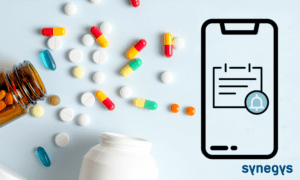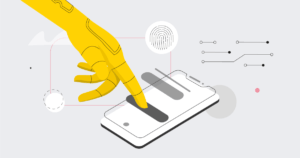The Ultimate Pill and Medication Reminder App – Text Messaging Reminders
Commercial Mobile Reminder Apps – Issue with Study Protocol and Regulatory Compliance
Custom Mobile Apps: A Costly and Non-Ubiquitous Solution
of challenges. The issue of ubiquity comes into question, as smartphones come in different operating systems like iOS and Android. This necessitates the development and maintenance of different apps for each platform. Moreover, these apps often rely on internet connectivity for syncing, a limitation not shared by SMS-based applications, which can function seamlessly with standard phone network coverage. Smartphone adoption varies across demographics, with 97% of Americans aged 18 to 29 owning one in 2023, compared to 73% of individuals aged 55+ (Source: Statista, 2023) having a smartphone.
Text Message Services are Ubiquitous
smartphones or basic feature phones. A significant portion of the population aged 55 and above relies on basic mobile devices with SMS capabilities. Given that 97% of Americans own a mobile phone with SMS (source: Pew Research), text messaging remains the most effective means of reaching the majority of patients within a clinical trial or research study. Furthermore, study teams don’t need to invest time and resources in educating study patients about downloading and using an application, as text messaging is a universally understood and readily used communication tool.
The Benefit of Text Message Reminders: Customization, Personalization & Extended Scope
The strength of text-message-based medication reminders lies in their ability to replicate all the functions of a medication reminder app or pill reminder app, while offering an even more immersive and inclusive experience, centrally controlled by study teams. Here are some ways text-based medication reminders can be tailored to suit the unique needs of each study:
- Soliciting patient responses to confirm medication or device compliance, typically with Y (yes) or N (no) responses, harnessing the efficiency of single characters.
- Sending automated “nudges” or gentle text reminders in cases where confirmation is not received.
- Allowing patients to reply with their own free-form responses, potentially including confirmation details like the pharmaceutical drug name, dosage, and timing.
- Compatibility with picture messaging when visual medication confirmation is warranted.
- Incorporating AI to send reminders only when necessary, understand natural language, automatically generate responses, and personalize messages based on a patient’s preferences and past interactions. Our partner Synegys has an AI-based text message medication reminder service has been shown to improve medication adherence by an impressive 68%, compared to 23% for normal 2-way text messaging (where there is a reminder and reply) and a mere 4% for 1-way text messaging (where there is only a reminder sent) (Source: “AI puts Intelligence into Medication Reminders“).
Patient Preferences for Texting
A study conducted by SR Health by Solutionreach published by Modern Healthcare in September 2020 highlighted a noteworthy shift in patient communication preferences during the COVID-19 outbreak. Interest in receiving phone calls from healthcare providers decreased by approximately 14%, while patients demonstrated a heightened interest in text messaging as a phone call alternative. Texts offer unmatched convenience and greater scheduling flexibility for clinical trial participants.
The Role of Text Message Solutions in Ongoing Clinical Trials
In the post-COVID-19 era, ensuring the continuity of clinical trials without compromising patient safety is paramount. Synegys offers a comprehensive suite of text message solutions that stand as one of the most effective means to navigate these challenges in the contemporary medical landscape.
Unlocking the Potential of Text Message Medication Reminders with Synegys
To delve deeper into the realm of improving adherence with medication reminders, consider watching our informative video showcasing how we and our partner Synegys can bolster medication adherence and introduce additional tools designed to streamline your research team’s operations.
Conclusion
Text-based medication reminders represent an appealing solution for elevating overall study compliance. Pharmaceutical research unequivocally illustrates the exorbitant cost of non-compliance. When it comes to deploying apps for medication reminders, text messaging emerges as an preeminent choice. There’s no need to hunt for a “mobile app” to prompt patients to adhere to their medication regimens; they already possess a built-in app on their phones called “text messaging,” a tool that most patients employ daily to connect with friends and family. By embracing text messaging reminders, you can not only enhance patient adherence but also streamline your clinical trial operations, ultimately leading to more successful and cost-effective trials. In an era where technology and patient preferences are evolving, text messaging provides a versatile and patient-friendly solution for improving the patient experience in clinical trials. To delve deeper into how text messaging can enhance medication adherence in your clinical trials, leveraging the very devices and mobile channels your patients routinely use, explore our capabilities or reach out to us today for a quote.



